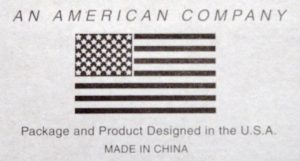 When we discuss international trade and balance of payments, there are two types of accounts. There is the current account, which includes goods and services imported and exported and receives the most political attention. In 2016, the American people imported $479 billion worth of goods and services from Chinese producers, and we sold $170 billion worth of goods and services to Chinese customers. That made for a $309 billion current account deficit. In other words, we purchase more goods and services from Chinese producers than Chinese consumers purchase from American producers.
When we discuss international trade and balance of payments, there are two types of accounts. There is the current account, which includes goods and services imported and exported and receives the most political attention. In 2016, the American people imported $479 billion worth of goods and services from Chinese producers, and we sold $170 billion worth of goods and services to Chinese customers. That made for a $309 billion current account deficit. In other words, we purchase more goods and services from Chinese producers than Chinese consumers purchase from American producers.
How much of a problem is it when there is a deficit, or a negative imbalance, on current accounts? Let’s look at it.
I buy more from my grocer than he buys from me. Our Department of Defense buys more from General Dynamics than General Dynamics buys from our Department of Defense. With just a bit of thought, one could come up with thousands of examples in which one party buys more from another than that party buys from it — creating deficits in current accounts. But a current account deficit is always offset by a surplus somewhere else.
That somewhere else is known as the capital, or financial, account. This account consists of direct foreign investment, such as the purchase or construction of machinery, buildings or whole manufacturing plants. The capital account also consists of portfolio investment, such as purchases of stocks and bonds. In our capital account, the U.S. has a huge surplus with China. That means money is flowing into our country from China. In other words, Chinese people are investing more money into the U.S. — in the forms of home and factory purchases, stocks, and bonds — than Americans are investing in China. Of necessity, the deficit that we have with China on our current account, ignoring timing issues, must equal the surplus we have with China on our capital account.
It turns out that foreigners own $30 trillion worth of U.S. assets, such as stocks, Treasury bonds, manufacturing plants and real estate. One of the reasons that foreigners hold so much U.S. capital is that our country is one of the world’s most attractive places to invest. Secondly, our capital markets, unlike our goods markets, are open to foreigners. Foreigners can buy and sell any U.S. asset in any quantity, except in cases in which national security is an issue. One of the troubling aspects of foreign confidence in America is that foreigners invest so much in U.S. Treasury bonds. That in turn gives the U.S. Congress greater latitude to engage in profligate spending. Japan owns $1.1 trillion worth of U.S. Treasury bonds, and China owns $1 trillion.
What about President Donald Trump’s call to reduce our current account trade deficit? By the way, we know that we’re being deceived when a politician talks only about the current account deficit, without a word about the capital account surplus. If foreigners sell us fewer goods, they will earn fewer dollars. With fewer dollars, they will be able to make fewer investments in America. But that’s fine with politicians. The beneficiaries of trade restrictions are visible. Tariffs on tires, clothing and electronics will mean more profits and jobs and more votes for politicians. The victims of trade restrictions, such as people in the real estate market and other areas where foreigners are investing, are less visible. Last year, Chinese citizens alone purchased record amounts of residential and commercial real estate, bringing their five-year real estate investment total to more than $110 billion (http://tinyurl.com/z3nd4fn).
Let’s put trade deficits into historical perspective. If trade deficits were something for a president to fret about, every U.S. president from 1790 to today ought to have been fretting. For most of our history, we have had current account deficits (http://tinyurl.com/jczqrhu). I should say every president except Herbert Hoover and Franklin D. Roosevelt, whose administrations ushered in the Great Depression. Nine out of the 10 years of the economic downturn of the 1930s, our nation had a current account trade surplus. Should we reproduce the economic policies of that era and re-create the “wonderful” trade surplus?
COPYRIGHT 2017 CREATORS.COM
Photo credit: By Bill Bradford from Houston, TX, USA – AN AMERICAN COMPANY, CC BY 2.0, Link
 Walter E. Williams is a professor of economics at George Mason University.
Walter E. Williams is a professor of economics at George Mason University.
The views expressed in opinion articles are solely those of the author and are not necessarily either shared or endorsed by Black Community News.
 CURE News and Clergy Blog News and Commentary for Christians
CURE News and Clergy Blog News and Commentary for Christians



